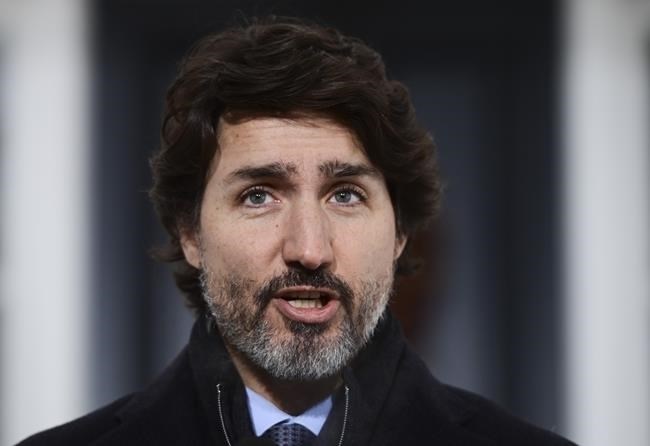
Prime Minister Justin Trudeau holds a press conference at Rideau Cottage during the COVID-19 pandemic in Ottawa on Tuesday, Jan. 5, 2021.
Image Credit: THE CANADIAN PRESS/Sean Kilpatrick
January 05, 2021 - 1:00 PM
OTTAWA - Prime Minister Justin Trudeau expressed his frustration Tuesday as signs pointed to the COVID-19 pandemic taking a dark turn in Canada.
In London, Ont., the morgue was at capacity, a field hospital was opened in Burlington, Ont., and Quebec officials were mulling a near-total lockdown as cases continued to rise at an accelerated pace.
Canada's chief public health officer Dr. Theresa Tam noted in an Ottawa new conference that earlier in the pandemic, it took five months for Canada to hit 500,000 cases. But now, it is taking just two weeks for 100,000 new cases to emerge.
"This ever-more-rapid accumulation of cases will continue until we can make significant progress in interrupting spread, which is why we must all continue our efforts," she said.
While officials said upwards of a million doses of COVID-19 vaccines will arrive by month's end, the rate at which Canadians are being vaccinated appears to be lagging behind some other countries.
One open-source effort to track vaccinations suggests only 35 per cent of the doses that have arrived in Canada so far have been administered, amounting to 0.394 per cent of the population receiving a shot so far.
In the U.K., over a million doses have already been given, and in Israel, 12 per cent of the population has already received a first dose. What more the federal government could do to help provinces roll out vaccines faster is expected to be on the agenda at a meeting between Trudeau and his provincial and territorial counterparts Thursday.
"I think all Canadians, including me, are frustrated to see vaccines in freezers and not in people's arms," Trudeau said.
Maj.-Gen. Dany Fortin, who is overseeing vaccine distribution, said efforts continue to reinforce the infrastructure required to store and transport vaccines, as well as expand distribution networks.
"I want to reaffirm to all Canadians that while quantities seem limited, we are scaling up," he said. "This is a deliberate operation."
As vaccines arrive in Canada, they are transferred to the provinces, which have control over administering the shots to individual recipients.
Nova Scotia rolled out its plan Tuesday, saying it intends to make the vaccine available to 75 per cent of the eligible population by the end of September, and focus on high-priority populations over the next four months.
In Ontario, provincial authorities promised all long-term-care residents, workers and essential caregivers in COVID-19 hot spots will be vaccinated by Jan. 21 and vaccinations in Ontario's Indigenous communities will begin later this week.
In Quebec a total of 32,763 vaccines have been administered so far. A rising daily case count — more than 2,500 new diagnoses a day for the last several days — has officials mulling a nearly complete shutdown of the province, including schools, and imposing a curfew, some reports said.
While Canadians await the sharp sting of the needle, many are also feeling the sharp sting of watching their friends and neighbours returning from holiday vacations abroad and potentially accessing federal paid sick leave to cover off their two-week quarantine requirement.
Trudeau stressed Tuesday that the sick leave benefit, worth up to $1,000, was introduced so Canadians wouldn't feel pressure to go to work with COVID-19 symptoms, not as a safety net to help people who head out on vacation.
"We didn't bring it, and we didn't imagine when we passed it unanimously in the House with the support of all parties, that people would use it to pay for their quarantines after having gone south for a two-week vacation," he said. "So that is something we are going to fix right now." He also had sharp words for federal and provincial politicians who chose to travel abroad despite months of recommendations against non-essential travel, accusing them of undermining the collective effort of keeping Canadians safe. "As leaders we've been encouraging and exhorting Canadians to continue to do the right thing," he said.
"So it is unfortunate to see a number of politicians not take their own advice." What more the federal government may be considering, or could do, to put an end to discretionary travel is unclear. A two-week ban on flights into Canada from the U.K. due to a more transmissible variant of the novel coronavirus circulating there expires Jan. 6, and Trudeau did not directly answer a question about whether it will be extended.
Intergovernmental Affairs Minister Dominic LeBlanc said the federal government will look at just about any measure to discourage people from travelling internationally.
But he says Canada doesn't want to join the short list of countries that require government approval for travel, with measures such as exit visas.
This report by The Canadian Press was first published Jan. 5, 2021.
News from © The Canadian Press, 2021